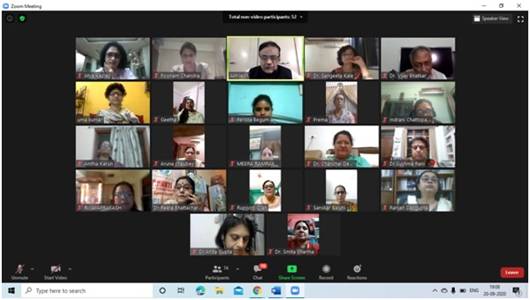Experts deliberate on ways of addressing key concerns of women’s participation and leadership in science, in STIP 2020
New Delhi: Key concerns regarding the low percentage of Indian women in science and the gender gap especially in terms of women leaders in science, and methods to address them in the new Science Technology and Innovation Policy STIP 2020, were discussed at an information session and discussion on STIP2020 recently. Over a hundred women scientists and science enthusiasts along with Team STIP-2020 Secretariat attended the discussion.
Dr Vijay Bhatkar, President, VIBHA (Vijnanabharati), who presided over the discussion, emphasised that sustainability and Atmanirbharta is possible only when women are given their due importance. Several issues in terms of the low institutional mechanism to nurture women innovators, age barrier issues, leaky pipeline, funding for women-led startups, leadership, gender bias and the need for women entrepreneurs, inclusive and diverse STI ecosystem while addressing stereotypes with regard to family and parenting were deliberated.
Dr Akhilesh Gupta, Head, STIP 2020 presented some major interventions that were suggested during the track II expert consultations in terms of implementation of Indian version of Athena SWAN Charter, mandatory positions in academics, 30% representation of women, leadership role to senior women scientists in research and administration.
The information session was organised by Vijnanabharati, a science movement with swadeshi spirit spread across 22 states across the country, under its independent entity SHAKTI, which is a national movement for women empowerment.
Dr Gupta highlighted some important recent government initiatives including the DST’s “KIRAN” (Knowledge Involvement in Research Advancement through Nurturing) scheme particularly the CURIE (Consolidation of University Research for Innovation and Excellence in Women Universities) programme, the Department of Biotechnology’s BioCARe programme and others.
He stressed on the need to address issues related to career breaks for women suggesting dual recruitment policy, flexibility in work timings, daycare centres, setting up of an ‘Office of Equity and Inclusion’, etc.
Dr Gupta emphasized on the participation of women in science and education taking some historic examples of great women scientists and philosophers like, Leelavati, Gargi and Khana while introducing the new STI Policy in terms of its need and unique features. He gave a comprehensive view of the formulation process with particular reference to track 1 public consultation and stressed on the significance of women’s participation in STIP2020.
Experts suggested about building support network for women entrepreneurs and women-led economy. The requirement of a clear and strict implementation strategy, sensitization and awareness in terms of policies and programmes and emphasis on the revival of state universities.

